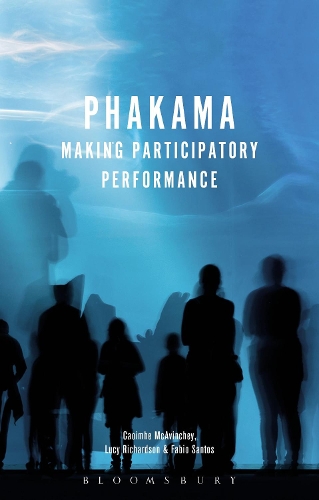
Phakama: Making Participatory Performance
(Hardback)
Available Formats
Publishing Details
Phakama: Making Participatory Performance
By (Author) Dr. Caoimhe McAvinchey
By (author) Fabio Santos
By (author) Lucy Richardson
Illustrated by Andrew Siddall
Bloomsbury Publishing PLC
Methuen Drama
22nd February 2018
United Kingdom
Classifications
Professional and Scholarly
Non Fiction
Childrens / Teenage general interest: Drama and performing arts
Dance
Educational: Drama and performance arts
Other performing arts
Theatre direction and production
792
Physical Properties
Hardback
288
Width 156mm, Height 234mm
581g
Description
An international arts organisation and network engaging with music, dance, theatre and visual art, Phakama creates adventurous, site-responsive performances with large groups of people from diverse backgrounds. With contributions from participants, artists, academics and cultural commentators from India, Ireland, South Africa, the UK and USA, this book features case studies, interviews and articles covering two decades of practice. At the heart of the book is a selection of carefully explained and beautifully illustrated exercises which will enable Phakama's methodology to be used by organisations and practitioners working with young people internationally. Phakama is a Xhosa and Zulu word for stand up, arise, empower yourself. With a focus on collaborative, non-hierarchical performance making, Phakama invites cultural sharing and critical engagement with the world we live in. As well as engaging with political and critical concerns about contemporary theatre and performance, the book offers unique approaches to devising theatre, applied and social theatre, intercultural performance practices and pedagogic models of collaboration and cultural leadership.
Reviews
Provides a valuable insight into how Phakama's practice builds a collaborative ethos from the ground up ... the book weaves a rich tapestry of experiences from facilitators and participants into a critical context. * New Theatre Quarterly *
Phakama has been on a long journey of discovery and creating a space for people to belong. It has and will continue to be a crucial part of many people's lives because governments around the world continue to make life unliveable so sanctuary has to be sought. Phakama holds a million stories and the unpacking of these narratives and exploration of methodology to support and nurture a new way of being needs to be documented and shared. This is a book for anyone who cares about human rights and believes the arts are a fundamental part of who we are and how we engage with the world and no one does this better than Phakama." * Jenny Sealy, Artistic Director of Graeae Theatre Company *
Lucy Richardson, Fabio Santos and Caoimhe McAvinchey have skillfully compiled this impressive book about a remarkable set of practices that coalesce around Phakama, not so much an arts organisation as a phenomenon in participatory arts and cultural practices. This important book speaks through a huge variety of voices participants, artists, producers, academics, journalists, to the widest possible audience. Providing a history, methodological insight and detailed account of the artistic, ethical and political underpinnings of Phakamas work since 1996, this is an invaluable resource for anyone with an interest in the ways in which innovative arts practices have intervened in different locations across the world to help young people to explore and improve the conditions in which they live. * Dr. Alison Jeffers, Senior Lecturer in Drama, University of Manchester, UK *
Author Bio
Lucy Richardson is Senior Lecturer in Performing Arts at London Metropolitan University and one of the early members of Phakama. Her research interest, which includes both traditional and performance research, is in creative processes and the politics of participation. She established The Facility: Research Centre in Creative Practice at London Met to champion practice based research. Fabio Santos is the former Artistic Director of Phakama and a contributing writer on a collaboratively written handbook of transitional arts practice, led by Lucy Neal. Caoimhe McAvinchey is Senior Lecturer in Drama, Theatre and Performance Studies at Queen Mary University London and has published research reports, academic articles and books within the field of applied and social theatre.
